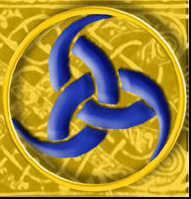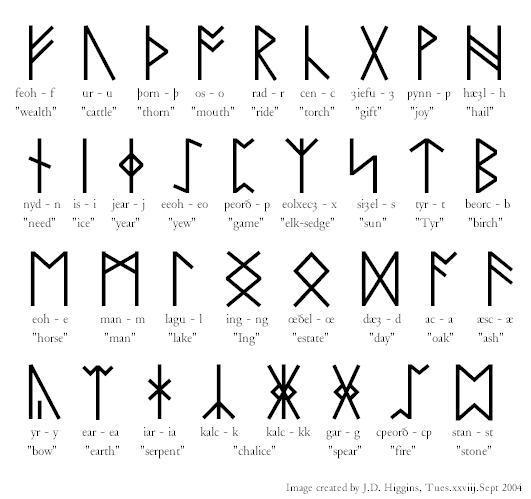
Terms of
Use
Submissions
~ Historical & Classical Poetry ~
The Anglo-Saxon Rune
Poem
Jump to the modern English translation
below
Each line consists of two half-stanzas, following the alliterative verse form of Fornyrislag, or Old Meter.
Feoh by■ frofur fira gehwylcum;
sceal eah manna gehwylc miclun hyt dŠlan
gif he wile for drihtne domes hleotan.
Ur by■ anmod ond oferhyrned,
felafrecne deor, feohte■ mid hornum
mŠre morstapa; ■Št is modig wuht.
đorn by■ earle scearp; egna gehwylcum
anfeng ys yfyl, ungemetum re■e
manna gehwelcum, e him mid reste.
Os by■ ordfruma Šlere sprŠce,
wisdomes wra■u ond witena frofur
and eorla gehwam eadnys ond tohiht.
Rad by■ on recyde rinca gehwylcum
sefte ond swi■hwŠt, ame sitte■ on ufan
meare mŠgenheardum ofer milpa■as.
Cen by■ cwicera gehwam, cu■ on fyre
blac ond beorhtlic, byrne■ oftust
Šr hi Š■elingas inne resta■.
Gyfu gumena by■ gleng and herenys,
wra■u and wyr■scype and wrŠcna gehwam
ar and Štwist, e by■ o■ra leas.
Wenne bruce■, e can weana lyt
sares and sorge and him sylfa hŠf■
blŠd and blysse and eac byrga geniht.
HŠgl by■ hwitust corna; hwyrft hit of heofones lyfte,
wealca■ hit windes scura; weor■e■ hit to wŠtere syan.
Nyd by■ nearu on breostan; weor■e■ hi ■eah oft ni■a bearnum
to helpe and to hŠle gehwŠ■re, gif hi his hlysta■ Šror.
Is by■ ofereald, ungemetum slidor,
glisna■ glŠshluttur gimmum gelicust,
flor forste geworuht, fŠger ansyne.
Ger byŮ gumena hiht, onne God lŠte■,
halig heofones cyning, hrusan syllan
beorhte bleda beornum ond earfum.
Eoh by■ utan unsme■e treow,
heard hrusan fŠst, hyrde fyres,
wyrtrumun underwre■yd, wyn on e■le.
Peor by■ symble plega and hlehter
wlancum [on middum], ar wigan sitta■
on beorsele bli■e Štsomne.
Eolh-secg eard hŠf■ oftust on fenne
wexe on wature, wunda■ grimme,
blode brene beorna gehwylcne
e him Šnigne onfeng gede■.
Sigel semannum symble bi■ on hihte,
onne hi hine feria■ ofer fisces be■,
o■ hi brimhengest bringe■ to lande.
Tir bi■ tacna sum, healde trywa wel
wi■ Š■elingas; a bi■ on fŠrylde
ofer nihta genipu, nŠfre swice■.
Beorc by■ bleda leas, bere■ efne swa eah
tanas butan tudder, bi■ on telgum wlitig,
heah on helme hrysted fŠgere,
geloden leafum, lyfte getenge.
Eh by■ for eorlum Š■elinga wyn,
hors hofum wlanc, Šr him hŠle■ ymb[e]
welege on wicgum wrixla■ sprŠce
and bi■ unstyllum Šfre frofur.
Man by■ on myrg■e his magan leof:
sceal ■eah anra gehwylc orum swican,
forum drihten wyle dome sine
■Št earme flŠsc eor■an betŠcan.
Lagu by■ leodum langsum ge■uht,
gif hi sculun ne■an on nacan tealtum
and hi sŠy■a swy■e brega■
and se brimhengest bridles ne gym[e].
Ing wŠs Šrest mid East-Denum
gesewen secgun, o■ he sian est
ofer wŠg gewat; wŠn Šfter ran;
us Heardingas one hŠle nemdun.
E■el by■ oferleof Šghwylcum men,
gif he mot Šr rihtes and gerysena on
brucan on bolde bleadum oftast.
DŠg by■ drihtnes sond, deore mannum,
mŠre metodes leoht, myrg■ and tohiht
eadgum and earmum, eallum brice.
Ac by■ on eor■an elda bearnum
flŠsces fodor, fere■ gelome
ofer ganotes bŠ■; garsecg fanda■
hwŠ■er ac hŠbbe Š■ele treowe.
Ăsc bi■ oferheah, eldum dyre
sti■ on sta■ule, stede rihte hylt,
eah him feohtan on firas monige.
Yr by■ Š■elinga and eorla gehwŠs
wyn and wyr■mynd, by■ on wicge fŠger,
fŠstlic on fŠrelde, fyrdgeatewa sum.
Iar by■ eafix and eah a bruce■
fodres on foldan, hafa■ fŠgerne eard
wŠtre beworpen, Šr he wynnum leofa■.
Ear by■ egle eorla gehwylcun,
onn[e] fŠstlice flŠsc onginne■,
hraw colian, hrusan ceosan
blac to gebeddan; bleda gedreosa■,
wynna gewita■, wera geswica■.
Wealth is a comfort to all men;
yet must every man bestow it freely,
if he wish to gain honour in the sight of the Lord.
The aurochs is proud and has great horns;
it is a very savage beast and fights with its horns;
a great ranger of the moors, it is a creature of mettle.
The thorn is exceedingly sharp,
an evil thing for any knight to touch,
uncommonly severe on all who sit among them.
The mouth is the source of all language,
a pillar of wisdom and a comfort to wise men,
a blessing and a joy to every knight.
Riding seems easy to every warrior while he is indoors
and very courageous to him who traverses the high-roads
on the back of a stout horse.
The torch is known to every living man by its pale, bright flame;
it always burns where princes sit within.
Generosity brings credit and honour, which support one's dignity;
it furnishes help and subsistence
to all broken men who are devoid of aught else.
Bliss he enjoys who knows not suffering, sorrow nor anxiety,
and has prosperity and happiness and a good enough house.
Hail is the whitest of grain;
it is whirled from the vault of heaven
and is tossed about by gusts of wind
and then it melts into water.
Trouble is oppressive to the heart;
yet often it proves a source of help and salvation
to the children of men, to everyone who heeds it betimes.
Ice is very cold and immeasurably slippery;
it glistens as clear as glass and most like to gems;
it is a floor wrought by the frost, fair to look upon.
Summer is a joy to men, when God, the holy King of Heaven,
suffers the earth to bring forth shining fruits
for rich and poor alike.
The yew is a tree with rough bark,
hard and fast in the earth, supported by its roots,
a guardian of flame and a joy upon an estate.
Peorth is a source of recreation and amusement to the great,
where warriors sit blithely together in the banqueting-hall.
The Eolh-sedge is mostly to be found in a marsh;
it grows in the water and makes a ghastly wound,
covering with blood every warrior who touches it.
The sun is ever a joy in the hopes of seafarers
when they journey away over the fishes' bath,
until the courser of the deep bears them to land.
Tiw is a guiding star; well does it keep faith with princes;
it is ever on its course over the mists of night and never fails.
The poplar bears no fruit; yet without seed it brings forth suckers,
for it is generated from its leaves.
Splendid are its branches and gloriously adorned
its lofty crown which reaches to the skies.
The horse is a joy to princes in the presence of warriors.
A steed in the pride of its hoofs,
when rich men on horseback bandy words about it;
and it is ever a source of comfort to the restless.
The joyous man is dear to his kinsmen;
yet every man is doomed to fail his fellow,
since the Lord by his decree will commit the vile carrion to the earth.
The ocean seems interminable to men,
if they venture on the rolling bark
and the waves of the sea terrify them
and the courser of the deep heed not its bridle.
Ing was first seen by men among the East-Danes,
till, followed by his chariot,
he departed eastwards over the waves.
So the Heardingas named the hero.
An estate is very dear to every man,
if he can enjoy there in his house
whatever is right and proper in constant prosperity.
Day, the glorious light of the Creator, is sent by the Lord;
it is beloved of men, a source of hope and happiness to rich and poor,
and of service to all.
The oak fattens the flesh of pigs for the children of men.
Often it traverses the gannet's bath,
and the ocean proves whether the oak keeps faith
in honourable fashion.
The ash is exceedingly high and precious to men.
With its sturdy trunk it offers a stubborn resistance,
though attacked by many a man.
Yr is a source of joy and honour to every prince and knight;
it looks well on a horse and is a reliable equipment for a journey.
Iar is a river fish and yet it always feeds on land;
it has a fair abode encompassed by water, where it lives in happiness.
The grave is horrible to every knight,
when the corpse quickly begins to cool
and is laid in the bosom of the dark earth.
Prosperity declines, happiness passes away
and covenants are broken.
Source for original text and translation: "Runic and Heroic Poems" by Bruce Dickins, published in 1915.
Image: ę Jack Daniel Higgins 2004, released into the Public Domain .
